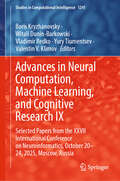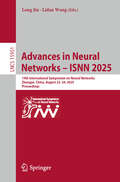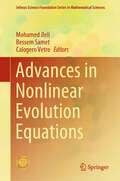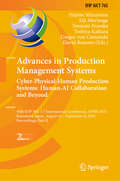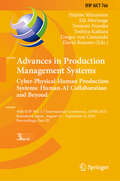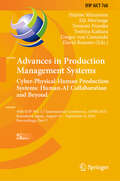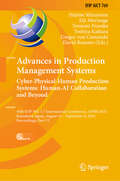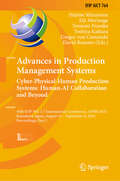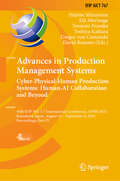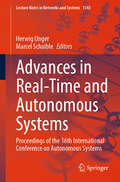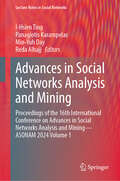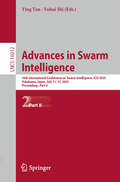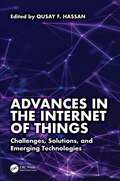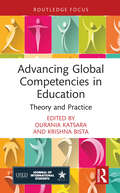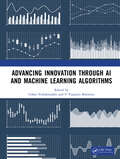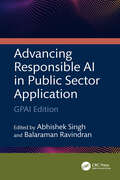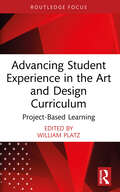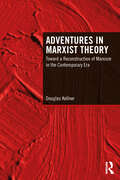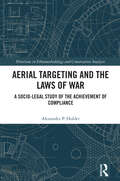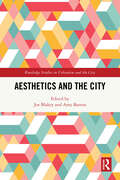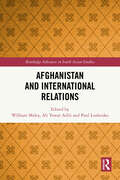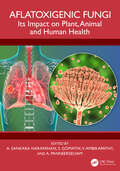- Table View
- List View
Advances in Neural Computation, Machine Learning, and Cognitive Research IX: Selected Papers from the XXVII International Conference on Neuroinformatics, October 20-24, 2025, Moscow, Russia (Studies in Computational Intelligence #1241)
by Valentin V. Klimov Boris Kryzhanovsky Witali Dunin-Barkowski Vladimir Redko Yury TiumentsevThis book describes new theories and applications of artificial neural networks, with a special focus on answering questions in neuroscience, biology and biophysics and cognitive research. It covers a wide range of methods and technologies, including deep neural networks, large-scale neural models, brain–computer interface, signal processing methods, as well as models of perception, studies on emotion recognition, self-organization and many more. The book includes both selected and invited papers presented at the XXVII International Conference on Neuroinformatics, held on October 20–24, 2025, in Moscow, Russia.
Advances in Neural Networks – ISNN 2025: 19th International Symposium on Neural Networks, Zhangye, China, August 22–24, 2025, Proceedings (Lecture Notes in Computer Science #15951)
by Long Jin Lidan WangThis volume constitutes the refereed proceedings of the 19th International Symposium on Neural Networks, ISNN 2025, held in Zhangye, China, during August 22–24, 2025. The 52 full papers were carefully reviewed and selected from 60 submission. They were organized in topical sections as follows: Design, Modeling and Application of AI Algorithms; Signal, Image, and Video Processing; Modeling, Analysis, and Implementation of Neural Networks; Control Systems, Robotics, and Autonomous Driving; Machine Learning Methods and Applications.
Advances in Nonlinear Evolution Equations (Infosys Science Foundation Series)
by Mohamed Jleli Bessem Samet Calogero VetroThis book presents a collection of significant and original contributions that delve into the realm of nonlinear evolution equations and their applications, encompassing both theory and practical usage. Serving as a dynamic platform for interdisciplinary collaboration, it facilitates the exchange of innovative ideas among scientists from diverse fields who share a keen interest in the intricate world of evolution equations. The book bridges the gap between theory and practicality, offering valuable insights for researchers and enthusiasts alike, transcending disciplinary boundaries. Evolution equations, a subset of partial differential equations, serve as mathematical tools to depict the temporal transformation of physical systems from their initial states. These equations find widespread utility in modeling various real-world phenomena across diverse disciplines. Notable examples of nonlinear evolution equations include the heat equation, which characterizes the evolution of heat distribution over time; the nonlinear Schrödinger equation, instrumental in understanding data transmission in fiber optic communication systems; the Korteweg-de Vries equation, illuminating the dynamics of surface water waves; and the portrayal of ion-acoustic waves in cold plasma.
Advances in Production Management Systems. Cyber-Physical-Human Production Systems: 44th IFIP WG 5.7 International Conference, APMS 2025, Kamakura, Japan, August 31 - September 4, 2025, Proceedings, Part II (IFIP Advances in Information and Communication Technology #765)
by Hajime Mizuyama Gregor Von Cieminski David Romero Tomomi Nonaka Toshiya Kaihara Eiji MorinagaThe six-volume set IFIP AICT 764-769 constitutes the refereed proceedings of the 44th IFIP WG 5.7 International Conference on Advances in Production Management Systems, APMS 2025, held in Kamakura, Japan, from August 31st to September 4th, 2025. The 227 full papers presented in these proceedings were carefully reviewed and selected from 247 submissions, which cover a broad array of research and technological developments on the present and future of &“Cyber-Physical-HUMAN Production Systems&”. They were categorized under the following topical sections: Part I: Human-centred Work Systems for the Operator 4.0/5.0 in Manufacturing, Logistics, and Service Domains; AI-Driven Decision Support and Human-AI Collaboration for Smart and Sustainable Supply Chains; Digital Twins and AI for Dynamic Scheduling and Human-Centric Applications. Part II: Smart Manufacturing Evolution: Integrating AI and the Digital Twin for Human-centric, Circular and Collaborative Production Systems; Human-centered Service Engineering and Digital Transformation for Sustainable Service Industries; Shaping Human Capital for Industry 5.0: Skills, Knowledge and Technologies for Human-centric, Resilient, and Sustainable Manufacturing; Experiential Learning in Engineering Education; Theoretical and Practical Advances in Human-centric, Resilient, and Sustainable Supply Chain Management; Maintenance and Asset Lifecycle Management for Sustainable and Human-centered Production; Methods and Tools for Assessing the Value of Digital, Sustainable and Servitized Offerings of Manufacturing Companies. Part III: Digital Transformation Approaches in Production and Management; Digital Technologies in Manufacturing and Logistics: Exploring Digital Twin, IoT, and Additive Manufacturing; Enhancing the Value Creation Mechanisms of Manufacturing Value Chains through Digital Platforms, Circular strategies, and Servitization Principles. Part IV: Enhancing Value Chain Resilience through Digital Technologies; How Supply Chain Can React to Internal and External Disruptions?; Mechanism Design for Production, Service and Supply Chain Management; Transforming Engineer-to-Order Projects, Supply Chains, and Systems; Designing Next Generation Lean Models Supporting Social, Sustainable, and Smart Production Systems. Part V: Advancing Eco-efficient and Circular Industrial Practices; Upgrade Circular Economy for the Manufacturing Industry; Cyber-Physical System-Based Approaches to Achieve Sustainability; Industrial Data Spaces and Sustainability; Enabling Circularity in Batteries & E-Waste with Digital Technologies: From Production to Recycling; Circular and Green Manufacturing; Sustainable Product Design and Engineering. <span style="font-size: 11.0pt; line-height: 115%; font-family: 'Calibri',sans-serif; mso-fareast-font-family: 'Times New
Advances in Production Management Systems. Cyber-Physical-Human Production Systems: 44th IFIP WG 5.7 International Conference, APMS 2025, Kamakura, Japan, August 31 - September 4, 2025, Proceedings, Part III (IFIP Advances in Information and Communication Technology #766)
by Hajime Mizuyama Gregor Von Cieminski David Romero Tomomi Nonaka Toshiya Kaihara Eiji MorinagaThe six-volume set IFIP AICT 764-769 constitutes the refereed proceedings of the 44th IFIP WG 5.7 International Conference on Advances in Production Management Systems, APMS 2025, held in Kamakura, Japan, from August 31st to September 4th, 2025. The 227 full papers presented in these proceedings were carefully reviewed and selected from 247 submissions, which cover a broad array of research and technological developments on the present and future of &“Cyber-Physical-HUMAN Production Systems&”. They were categorized under the following topical sections: Part I: Human-centred Work Systems for the Operator 4.0/5.0 in Manufacturing, Logistics, and Service Domains; AI-Driven Decision Support and Human-AI Collaboration for Smart and Sustainable Supply Chains; Digital Twins and AI for Dynamic Scheduling and Human-Centric Applications. Part II: Smart Manufacturing Evolution: Integrating AI and the Digital Twin for Human-centric, Circular and Collaborative Production Systems; Human-centered Service Engineering and Digital Transformation for Sustainable Service Industries; Shaping Human Capital for Industry 5.0: Skills, Knowledge and Technologies for Human-centric, Resilient, and Sustainable Manufacturing; Experiential Learning in Engineering Education; Theoretical and Practical Advances in Human-centric, Resilient, and Sustainable Supply Chain Management; Maintenance and Asset Lifecycle Management for Sustainable and Human-centered Production; Methods and Tools for Assessing the Value of Digital, Sustainable and Servitized Offerings of Manufacturing Companies. Part III: Digital Transformation Approaches in Production and Management; Digital Technologies in Manufacturing and Logistics: Exploring Digital Twin, IoT, and Additive Manufacturing; Enhancing the Value Creation Mechanisms of Manufacturing Value Chains through Digital Platforms, Circular strategies, and Servitization Principles. Part IV: Enhancing Value Chain Resilience through Digital Technologies; How Supply Chain Can React to Internal and External Disruptions?; Mechanism Design for Production, Service and Supply Chain Management; Transforming Engineer-to-Order Projects, Supply Chains, and Systems; Designing Next Generation Lean Models Supporting Social, Sustainable, and Smart Production Systems. Part V: Advancing Eco-efficient and Circular Industrial Practices; Upgrade Circular Economy for the Manufacturing Industry; Cyber-Physical System-Based Approaches to Achieve Sustainability; Industrial Data Spaces and Sustainability; Enabling Circularity in Batteries & E-Waste with Digital Technologies: From Production to Recycling; Circular and Green Manufacturing; Sustainable Product Design and Engineering. <span style="font-size: 11.0pt; line-height: 115%; font-family: 'Calibri',sans-serif; mso-fareast-font-family: 'Times New
Advances in Production Management Systems. Cyber-Physical-Human Production Systems: 44th IFIP WG 5.7 International Conference, APMS 2025, Kamakura, Japan, August 31 - September 4, 2025, Proceedings, Part V (IFIP Advances in Information and Communication Technology #768)
by Hajime Mizuyama Gregor Von Cieminski David Romero Tomomi Nonaka Toshiya Kaihara Eiji MorinagaThe six-volume set IFIP AICT 764-769 constitutes the refereed proceedings of the 44th IFIP WG 5.7 International Conference on Advances in Production Management Systems, APMS 2025, held in Kamakura, Japan, from August 31st to September 4th, 2025. The 227 full papers presented in these proceedings were carefully reviewed and selected from 247 submissions, which cover a broad array of research and technological developments on the present and future of &“Cyber-Physical-HUMAN Production Systems&”. They were categorized under the following topical sections: Part I: Human-centred Work Systems for the Operator 4.0/5.0 in Manufacturing, Logistics, and Service Domains; AI-Driven Decision Support and Human-AI Collaboration for Smart and Sustainable Supply Chains; Digital Twins and AI for Dynamic Scheduling and Human-Centric Applications. Part II: Smart Manufacturing Evolution: Integrating AI and the Digital Twin for Human-centric, Circular and Collaborative Production Systems; Human-centered Service Engineering and Digital Transformation for Sustainable Service Industries; Shaping Human Capital for Industry 5.0: Skills, Knowledge and Technologies for Human-centric, Resilient, and Sustainable Manufacturing; Experiential Learning in Engineering Education; Theoretical and Practical Advances in Human-centric, Resilient, and Sustainable Supply Chain Management; Maintenance and Asset Lifecycle Management for Sustainable and Human-centered Production; Methods and Tools for Assessing the Value of Digital, Sustainable and Servitized Offerings of Manufacturing Companies. Part III: Digital Transformation Approaches in Production and Management; Digital Technologies in Manufacturing and Logistics: Exploring Digital Twin, IoT, and Additive Manufacturing; Enhancing the Value Creation Mechanisms of Manufacturing Value Chains through Digital Platforms, Circular strategies, and Servitization Principles. Part IV: Enhancing Value Chain Resilience through Digital Technologies; How Supply Chain Can React to Internal and External Disruptions?; Mechanism Design for Production, Service and Supply Chain Management; Transforming Engineer-to-Order Projects, Supply Chains, and Systems; Designing Next Generation Lean Models Supporting Social, Sustainable, and Smart Production Systems. Part V: Advancing Eco-efficient and Circular Industrial Practices; Upgrade Circular Economy for the Manufacturing Industry; Cyber-Physical System-Based Approaches to Achieve Sustainability; Industrial Data Spaces and Sustainability; Enabling Circularity in Batteries & E-Waste with Digital Technologies: From Production to Recycling; Circular and Green Manufacturing; Sustainable Product Design and Engineering. <span style="font-size: 11.0pt; line-height: 115%; font-family: 'Calibri',sans-serif; mso-fareast-font-family: 'Times New
Advances in Production Management Systems. Cyber-Physical-Human Production Systems: 44th IFIP WG 5.7 International Conference, APMS 2025, Kamakura, Japan, August 31 - September 4, 2025, Proceedings, Part VI (IFIP Advances in Information and Communication Technology #769)
by Hajime Mizuyama Gregor Von Cieminski David Romero Tomomi Nonaka Toshiya Kaihara Eiji MorinagaThe six-volume set IFIP AICT 764-769 constitutes the refereed proceedings of the 44th IFIP WG 5.7 International Conference on Advances in Production Management Systems, APMS 2025, held in Kamakura, Japan, from August 31st to September 4th, 2025. The 227 full papers presented in these proceedings were carefully reviewed and selected from 247 submissions, which cover a broad array of research and technological developments on the present and future of &“Cyber-Physical-HUMAN Production Systems&”. They were categorized under the following topical sections: Part I: Human-centred Work Systems for the Operator 4.0/5.0 in Manufacturing, Logistics, and Service Domains; AI-Driven Decision Support and Human-AI Collaboration for Smart and Sustainable Supply Chains; Digital Twins and AI for Dynamic Scheduling and Human-Centric Applications. Part II: Smart Manufacturing Evolution: Integrating AI and the Digital Twin for Human-centric, Circular and Collaborative Production Systems; Human-centered Service Engineering and Digital Transformation for Sustainable Service Industries; Shaping Human Capital for Industry 5.0: Skills, Knowledge and Technologies for Human-centric, Resilient, and Sustainable Manufacturing; Experiential Learning in Engineering Education; Theoretical and Practical Advances in Human-centric, Resilient, and Sustainable Supply Chain Management; Maintenance and Asset Lifecycle Management for Sustainable and Human-centered Production; Methods and Tools for Assessing the Value of Digital, Sustainable and Servitized Offerings of Manufacturing Companies. Part III: Digital Transformation Approaches in Production and Management; Digital Technologies in Manufacturing and Logistics: Exploring Digital Twin, IoT, and Additive Manufacturing; Enhancing the Value Creation Mechanisms of Manufacturing Value Chains through Digital Platforms, Circular strategies, and Servitization Principles. Part IV: Enhancing Value Chain Resilience through Digital Technologies; How Supply Chain Can React to Internal and External Disruptions?; Mechanism Design for Production, Service and Supply Chain Management; Transforming Engineer-to-Order Projects, Supply Chains, and Systems; Designing Next Generation Lean Models Supporting Social, Sustainable, and Smart Production Systems. Part V: Advancing Eco-efficient and Circular Industrial Practices; Upgrade Circular Economy for the Manufacturing Industry; Cyber-Physical System-Based Approaches to Achieve Sustainability; Industrial Data Spaces and Sustainability; Enabling Circularity in Batteries & E-Waste with Digital Technologies: From Production to Recycling; Circular and Green Manufacturing; Sustainable Product Design and Engineering. <span style="font-size: 11.0pt; line-height: 115%; font-family: 'Calibri',sans-serif; mso-fareast-font-family: 'Times New
Advances in Production Management Systems. Cyber-Physical-Human Production Systems: 44th IFIP WG 5.7 International Conference, APMS 2025, Kamakura, Japan, August 31-September 4, 2025, Proceedings, Part I (IFIP Advances in Information and Communication Technology #764)
by Hajime Mizuyama Gregor Von Cieminski David Romero Tomomi Nonaka Toshiya Kaihara Eiji MorinagaThe six-volume set IFIP AICT 764-769 constitutes the refereed proceedings of the 44th IFIP WG 5.7 International Conference on Advances in Production Management Systems, APMS 2025, held in Kamakura, Japan, from August 31st to September 4th, 2025. The 227 full papers presented in these proceedings were carefully reviewed and selected from 247 submissions, which cover a broad array of research and technological developments on the present and future of &“Cyber-Physical-HUMAN Production Systems&”. They were categorized under the following topical sections: Part I: Human-centred Work Systems for the Operator 4.0/5.0 in Manufacturing, Logistics, and Service Domains; AI-Driven Decision Support and Human-AI Collaboration for Smart and Sustainable Supply Chains; Digital Twins and AI for Dynamic Scheduling and Human-Centric Applications. Part II: Smart Manufacturing Evolution: Integrating AI and the Digital Twin for Human-centric, Circular and Collaborative Production Systems; Human-centered Service Engineering and Digital Transformation for Sustainable Service Industries; Shaping Human Capital for Industry 5.0: Skills, Knowledge and Technologies for Human-centric, Resilient, and Sustainable Manufacturing; Experiential Learning in Engineering Education; Theoretical and Practical Advances in Human-centric, Resilient, and Sustainable Supply Chain Management; Maintenance and Asset Lifecycle Management for Sustainable and Human-centered Production; Methods and Tools for Assessing the Value of Digital, Sustainable and Servitized Offerings of Manufacturing Companies. Part III: Digital Transformation Approaches in Production and Management; Digital Technologies in Manufacturing and Logistics: Exploring Digital Twin, IoT, and Additive Manufacturing; Enhancing the Value Creation Mechanisms of Manufacturing Value Chains through Digital Platforms, Circular strategies, and Servitization Principles. Part IV: Enhancing Value Chain Resilience through Digital Technologies; How Supply Chain Can React to Internal and External Disruptions?; Mechanism Design for Production, Service and Supply Chain Management; Transforming Engineer-to-Order Projects, Supply Chains, and Systems; Designing Next Generation Lean Models Supporting Social, Sustainable, and Smart Production Systems. Part V: Advancing Eco-efficient and Circular Industrial Practices; Upgrade Circular Economy for the Manufacturing Industry; Cyber-Physical System-Based Approaches to Achieve Sustainability; Industrial Data Spaces and Sustainability; Enabling Circularity in Batteries & E-Waste with Digital Technologies: From Production to Recycling; Circular and Green Manufacturing; Sustainable Product Design and Engineering. <span style="font-size: 11.0pt; line-height: 115%; font-family: 'Calibri',sans-serif; mso-fareast-font-family: 'Times New
Advances in Production Management Systems. Cyber-Physical-Human Production Systems: 44th IFIP WG 5.7 International Conference, APMS 2025, Kamakura, Japan, August 31-September 4, 2025, Proceedings, Part IV (IFIP Advances in Information and Communication Technology #767)
by Hajime Mizuyama Gregor Von Cieminski David Romero Tomomi Nonaka Toshiya Kaihara Eiji MorinagaThe six-volume set IFIP AICT 764-769 constitutes the refereed proceedings of the 44th IFIP WG 5.7 International Conference on Advances in Production Management Systems, APMS 2025, held in Kamakura, Japan, from August 31st to September 4th, 2025. The 227 full papers presented in these proceedings were carefully reviewed and selected from 247 submissions, which cover a broad array of research and technological developments on the present and future of &“Cyber-Physical-HUMAN Production Systems&”. They were categorized under the following topical sections: Part I: Human-centred Work Systems for the Operator 4.0/5.0 in Manufacturing, Logistics, and Service Domains; AI-Driven Decision Support and Human-AI Collaboration for Smart and Sustainable Supply Chains; Digital Twins and AI for Dynamic Scheduling and Human-Centric Applications. Part II: Smart Manufacturing Evolution: Integrating AI and the Digital Twin for Human-centric, Circular and Collaborative Production Systems; Human-centered Service Engineering and Digital Transformation for Sustainable Service Industries; Shaping Human Capital for Industry 5.0: Skills, Knowledge and Technologies for Human-centric, Resilient, and Sustainable Manufacturing; Experiential Learning in Engineering Education; Theoretical and Practical Advances in Human-centric, Resilient, and Sustainable Supply Chain Management; Maintenance and Asset Lifecycle Management for Sustainable and Human-centered Production; Methods and Tools for Assessing the Value of Digital, Sustainable and Servitized Offerings of Manufacturing Companies. Part III: Digital Transformation Approaches in Production and Management; Digital Technologies in Manufacturing and Logistics: Exploring Digital Twin, IoT, and Additive Manufacturing; Enhancing the Value Creation Mechanisms of Manufacturing Value Chains through Digital Platforms, Circular strategies, and Servitization Principles. Part IV: Enhancing Value Chain Resilience through Digital Technologies; How Supply Chain Can React to Internal and External Disruptions?; Mechanism Design for Production, Service and Supply Chain Management; Transforming Engineer-to-Order Projects, Supply Chains, and Systems; Designing Next Generation Lean Models Supporting Social, Sustainable, and Smart Production Systems. Part V: Advancing Eco-efficient and Circular Industrial Practices; Upgrade Circular Economy for the Manufacturing Industry; Cyber-Physical System-Based Approaches to Achieve Sustainability; Industrial Data Spaces and Sustainability; Enabling Circularity in Batteries & E-Waste with Digital Technologies: From Production to Recycling; Circular and Green Manufacturing; Sustainable Product Design and Engineering. <span style="font-size: 11.0pt; line-height: 115%; font-family: 'Calibri',sans-serif; mso-fareast-font-family: 'Times New
Advances in Real-Time and Autonomous Systems: Proceedings of the 16th International Conference on Autonomous Systems (Lecture Notes in Networks and Systems #1543)
by Herwig Unger Marcel SchaibleThis book serves as both a cutting-edge reference and a practical guide to building AI systems that are transparent, trustworthy, and tuned for real-world impact, featuring contributors from three continents and backed by leading institutions. Unlock the next wave of graph-based artificial intelligence, fuzzy logic, and human-centric machine learning with this authoritative Springer proceedings book. Twenty-four rigorously peer-reviewed chapters—spanning semantic similarity in Wikipedia, sparse distributed representations, explainable image generation, privacy-preserving mobility analytics, sentiment mining in public transport, counterfeit-banknote detection, 5G network capacity planning, and mixed-order traffic prediction—provide a panoramic view of state-of-the-art research that turns theory into deployable solutions. Readers gain step-by-step methodologies for building restricted Boltzmann machines enhanced with fuzziness, dual-graph semantic extractors, Bloom-filter variants, and the versatile GraphLearner simulator. Each contribution includes reproducible workflows, comparative baselines, and publicly available code or datasets—accelerating adoption in academia and industry alike. Highlights include a blueprint for emotion-aware AI agents, a cloud-intelligence framework that empowers SMEs with decision support, and an adaptive metric for privacy-preserving urban-mobility sharing that balances usability and anonymity.
Advances in Smart Computing and Applications: First International Conference, ICASCA 2025, Ahmedabad, India, February 15–16, 2025, Proceedings (Communications in Computer and Information Science #2619)
by Rajkumar Buyya Nirbhay Chaubey Savita Gandhi Harshal Arolkar Prerna AgrawalThis book constitutes the refereed proceedings of the 1st International Conference on Advances in Smart Computing and Applications, ICASCA 2025, held in Ahmedabad, India, during February 15–16, 2025. The 25 full papers were presented in this volume were carefully reviewed and selected from 112 submissions. They focus on Machine Learning, Deep Learning, Transfer Learning, Neural Computing, Artificial Intelligence, Reinforcement Learning, Recommendation systems, Soft computing, Intelligent Systems, Pattern Recognition, Natural Language Processing, Big Data Analytics, Networks, Text Mining, Web Mining, Data Streams, Image Processing, Distributed Databases, Block Chain.
Advances in Social Networks Analysis and Mining: Proceedings of the 16th International Conference on Advances in Social Networks Analysis and Mining - ASONAM 2024 Volume 1 (Lecture Notes in Social Networks)
by I-Hsien Ting Panagiotis Karampelas Reda Alhajj Min-Yuh DayThis book explores the evolution of social network analysis and mining (SNAM), a field that originated in social and business communities but has expanded significantly in recent years. The rise of online social platforms, email logs, phone records, and instant messaging systems has driven the development of advanced techniques for analyzing social networks, drawing heavily on graph theory and machine learning. As the Web increasingly becomes a social medium, it fosters human interaction, the sharing of experiences and knowledge, and the formation and evolution of communities. This transformation has amplified the importance of SNAM in fields such as academia, politics, homeland security, and business, where understanding the complex relationships between networked actors is crucial. This volume presents a comprehensive collection of cutting-edge research and developments in SNAM, offering a valuable resource for researchers and practitioners seeking to deepen their understanding of social networks and their applications.
Advances in Swarm Intelligence: 16th International Conference on Swarm Intelligence, ICSI 2025, Yokohama, Japan, July 11–15, 2025, Proceedings, Part II (Lecture Notes in Computer Science #16012)
by Ying Tan Yuhui ShiThis two-volume set LNCS 16011 and 16012 constitutes the refereed post-conference proceedings of the 16th International Conference on Advances in Swarm Intelligence, ICSI 2025, held in Yokohama, Japan, during July 11-15, 2025. The 54 revised full papers presented in these proceedings were carefully reviewed and selected from 116 submissions. The papers are organized in the following topical sections: Particle Swarm Optimization; Swarm Optimization Algorithms; Swarm of Large Language Models; Agent and Multi-agents; Vehicle Routing; Multiobjective Optimization; Approaches for Classification and Feature Selection; Prediction and Detection Algorithms; Machine Learning.
Advances in the Internet of Things: Challenges, Solutions, and Emerging Technologies
by Qusay F. HassanMany reports estimated that in 2024, the number of Internet of Things (IoT) devices exceeded 18 billion worldwide, with predictions suggesting that it could reach nearly 40 billion by 2033. Despite primarily being consumer devices, a growing number of them will find use in industrial and enterprise applications. This shows the significance of IoT and how it shapes the future. However, to realize its full potential, we must address its emerging challenges and highlight recent applications, advances, and trends, which is the focus of this book.Security and privacy represent some of the key challenges IoT adopters face. The severity of these issues is exacerbated by the growing number of IoT devices, the expansion of Industry 4.0 (and the emergence of Industry 5.0), and the significant increase in cybersecurity attacks. Considering that ensuring security and privacy is crucial for the successful adoption of IoT, this book dedicates several chapters to these areas. This book also introduces some novel models that improve IoT environments and presents several practical implementations that utilize IoT to demonstrate some of its real‑world applications. Furthermore, it examines several emerging technologies that enable the realization of advanced IoT environments. We see most IoT advances in three main areas: the integration of artificial intelligence/machine learning, network technologies, and hardware design. Therefore, this book dedicates several chapters to these areas. Most chapters touch on artificial intelligence/machine learning, emphasizing the significance of these technologies in today’s and next‑eneration applications.The main objective of this book is to capture the state of the art in IoT and explore some of its emerging challenges, solutions, and technologies. This peer‑eviewed book serves as a reference for researchers, academics, practitioners, and graduate‑evel students.
Advancing Global Competencies in Education: Theory and Practice (Routledge Studies in Global Student Mobility)
by Krishna Bista Ourania KatsaraAdvancing Global Competencies in Education offers an in-depth and insightful exploration into the evolving field of international education and intercultural communication. This comprehensive volume brings together innovative practices, case studies, and diverse perspectives from prominent scholars and practitioners across the globe, making it an essential resource for the contemporary educational landscape. With a strong emphasis on diversity, inclusion, and the enhancement of intercultural competence, this collection offers both theoretical insights and practical strategies. It serves as a vital resource for educators, policymakers, and practitioners dedicated to promoting intercultural understanding and collaboration within educational settings.
Advancing Innovation through AI and Machine Learning Algorithms
by V Vijayasri BolisettyThe International Conference on Microstructure, VLSI, Robotics, Communication, Electrical & Emerging Technologies using AI-ML Algorithms (ICMVRCET - 2025) is an essential gathering for those at the forefront of research and development in the fields of Microstructure Design, VLSI systems, Robotics, Communication technologies, and Emerging Electrical systems. This conference seeks to bridge the gap between academic research, industrial advancements, and real-world applications by focusing on the integration of Artificial Intelligence (AI) and Machine Learning (ML) algorithms in these rapidly evolving domains.
Advancing Responsible AI in Public Sector Application: GPAI Edition
by Abhishek Singh Balaraman RavindranResponsible use of AI in public sector applications requires engagement with various technical and non-technical areas such as human rights, inclusion, diversity, innovation and economic growth. The book covers topics spanning the technological socio-economic spectrum, including the potential of AI/ML technologies to address social and political inequities, privacy-enhancing technologies for datasets, friction-less data sharing and data stewardship models, regional/geographical inequities in extraction and so forth.Features: Focuses on technical aspects of responsible AI in the public sector Covers a wide range of topics spanning the technological socio-economic spectrum Presents viewpoints from public sector agencies as well as from practitioners Discusses privacy-enhancing technologies for collecting, processing and storing datasets, and friction Reviews frameworks to identify and address biased AI outcomes in the design, development and use of AI This book is aimed at professionals, researchers and students in artificial intelligence, computer science and engineering, policy-makers, social scientists, economists and lawyers.
Advancing Student Experience in the Art and Design Curriculum: Project-Based Learning (Routledge Focus on Design Pedagogy)
by William PlatzAdvancing Student Experience in the Art and Design Curriculum: Project-Based Learning will renew the critical attention paid to projects in the art and design curriculum and rigorously consider impacts on student experience.How exactly do we conceive of ‘projects’ in the context of a post-secondary creative arts curriculum? Each chapter in this book confronts the project as a specific, potent and transformative site of learning with vast engagement potential for the contemporary student. What unites the project-based learning methods in this book is an emphasis on the motivated and purposeful activities of the learners that result in tangible making and doing. Craft-based learning, practice-based learning, experimental learning design, culturally informed practices and reconsideration of obsolete learning mechanisms all coalesce in this text and evidence the innovativeness and abiding power of project-based learning.Each author in this book describes a diverse experience of learning that serves as an exemplar of project-based learning and illuminates the histories, theories and dynamics of the method for teachers, learning designers, educational theorists and interdisciplinarians.
Adventures in Marxist Theory: Toward a Reconstruction of Marxism in the Contemporary Era
by Douglas KellnerAdventures in Marxist Theory provides an introduction and overview of Marxian theory to demonstrate its contemporary relevance to social and political theory and a range of disciplines from philosophy to economics in both the humanities and the social sciences. The text argues that current historical developments and the evolution of economics, politics, society, culture, technology, and everyday life demonstrates the contemporary relevance of Marxism in both theory and politics in the contemporary era.The book presents a twenty-first century Marxism relevant to theorizing contemporary state capitalist and technological societies, critically dissecting their major social and political issues and problems, while advancing progressive social transformation in the interests of increased democracy and social justice. The volume opens with an Introduction describing a multi-disciplinary and critical approach to Marxism and its application to a wide range of contemporary issues, including the alienation of labor in the workplace, social divisions, and injustices such as classism, sexism, racism, and homophobia, and questions of technology, social media, and AI, as well as problems of ecological crisis, autocracy, and state oppression. Specific chapters address the Marxian critique of capitalism and theory of socialism, its concept of ideology and morality, its methodological synthesis of social science, critical theory, and its analyses of globalization, technology, and democracy.Written by a distinguished scholar of Marxism, critical theory, and cultural and political studies, the volume will be a key resource for instructors, students, and readers in historical and contemporary sociology, social and critical theory, political sociology, political and cultural studies, and Marx and Marxist studies.
Aerial Targeting and the Laws of War: A Socio-Legal Study of the Achievement of Compliance (Directions in Ethnomethodology and Conversation Analysis)
by Alexander P. HolderA ground-breaking socio-legal investigation of the in situ legal considerations involved in targeting and the use of force, Aerial Targeting and the Laws of War develops a new kind of evidence base for international action relating to the protection of civilians.Investigating the materials surrounding a civilian casualty incident that took place in Afghanistan in 2010, the book explores how a single strike – which was conducted in light of intelligence gathered by a militarised drone crew and resulted in the deaths of at least 15 civilians – became a lawful strike, that is, a strike that was deemed to have been compliant with the laws of war both at the point at which munitions were released and following two internal investigations. Through an ethnomethodological engagement with the transcripts, interviews, reports, and other materials associated with the incident, Alexander P. Holder examines the methods by which military personnel produce and maintain legitimate targets for the use of force.Re-focusing debates surrounding civilian harm upon the praxeological details of the military practices, which generate such harms, this book will appeal to scholars of sociology, military studies, and socio-legal studies with interests in the rules of war and ethnomethodological approaches to research.
Aesthetic Femininity and Domestic Modernity in Late Victorian Advice Literature (Routledge Research in Interior Design)
by Shu-chuan YanAesthetic Femininity and Domestic Modernity in Late Victorian Advice Literature considers how the domestic interior is constituted, imag(in)ed, contested, and mediated in the public forum of advice literature. It interrogates the construction and negotiation of aesthetic femininity and domestic modernity within the larger contexts of the New Journalism, the New Art Criticism, a new girls’ culture, and the emerging New Woman phenomenon in Britain.This book presents extensive new search on women-authored advice literature, including domestic advice manuals, home decoration books, and periodicals for young girls and adult women, within the discourse of household art. Part One justifies girls’ presence in the cultivation of beauty and taste at home. The practice of home decoration can be appropriated as a mode of agency and subjectivity for a girl to articulate her own voice and specific positioning as she grows toward womanhood. Part Two uncovers the ways in which advice literature serves as a mediator of decorating practices to help foster the affinities between gentlewomen’s domestic bodies and decorated interiors.Aimed at an interdisciplinary audience, this book adds to the growing body of scholarship on the studies of home cultures, art and interior design, nineteenth-century studies, and the social history of women.
Aesthetics and the City (Routledge Studies in Urbanism and the City)
by Joe Blakey Amy BarronAesthetics and the City engages aesthetics to explore the role of the city in urban experience. Drawing on diverse theories and global case studies, this edited collection examines how aesthetics relates to how cities and urban spaces are perceived, organised, and transformed.This book celebrates and ponders the wide diversity of aesthetic approaches within urban studies, noting that the way aesthetics is understood impacts what can be understood about cities and the urban order more generally. In its most general sense, aesthetics refers to our sensuous relation to the world. It invariably figures in how we make sense of the city and ourselves—bound to how urban life is experienced imaginatively, materially, socially, culturally, and politically. In an era where scholars have expressed concern at epistemological city-centrism, aesthetics is proposed as a versatile concept through which the centrality of the city to urban thought can be assessed. The book also explores how aesthetics intersects with a range of tangential concepts including power, the political, art, and affect. Ultimately it makes the case that this diverse ensemble of approaches to aesthetics can enable scholars to understand the city and its enduring relevance to urban thought.This book focuses on the concepts of "aesthetics" and "the city" and will appeal to scholars and students in urban studies, human geography, planning, politics, and sociology.
Affect, Consciousness and Self: The View from the Bottom of the Mind (Relational Perspectives Book Series)
by Daniel HillThis book argues that mental life is organized by and around affect. It proposes a clinical model for understanding how affect influences states of consciousness and self. It illustrates how, from moment to moment, affect determines the world we know, how we are disposed to being in it, and our capacity to function in it.After introducing consciousness and self as features of mind that have posed daunting problems for philosophy, neurology, and psychoanalysis, subsequent chapters propose a model for understanding them at the clinical level. Initial chapters are devoted to the influence of affect on the structure and dynamics of normal waking consciousness and on the self’s capacity to act agentically, to relate intersubjectively, and to develop itself. Final chapters discuss disordered states of consciousness and impeded self‑functioning, due to affect dysregulation and what all this looks like in patients with preoccupied and avoidant attachment patterns.Drawing on psychoanalysis, attachment theory, interpersonal and affective neurobiology, and traumatology, this book offers a fresh perspective on the importance of affect for psychoanalysts and psychodynamic psychotherapists.
Afghanistan and International Relations (Routledge Advances in South Asian Studies)
by William Maley Paul Lushenko Ali Yawar AdiliThis book explores various dimensions of recent international relations scholarship, taking the case of Afghanistan as a point of departure for discussion of these different themes.Contributors investigate a broad range of topics, including international relations theory, the nature of global order, ‘othering’ discourses, diplomacy, international law, the transformation of war, terrorism, gender politics, social media, state building, democratisation, refugee movements, globalisation, and historical lessons. The Afghanistan case helps illuminate the complexities of all these areas of analysis, and the book takes the analysis of Afghanistan in new directions. Theoretically, the authors interrogate the Afghanistan case’s implications for international relations, and vice-versa, by integrating multiple and complementary global or structural, state or institutional, and behaviouralist or leader-centric lenses. Conceptually, the chapters bridge the gap between theory and practice, thus reflecting the emergence of a problem-oriented approach to international relations scholarship. Methodologically, the research design employed by the authors is best characterised as ‘analytical eclecticism’. The majority of contributors originate from Afghanistan, something which again makes this book notable, and all three editors have extensive experience from time spent in Afghanistan.Using the Afghan case to explicate the importance of the relevance of theory and its related concepts to international relations studies, this book will be of interest to researchers in the field of international relations, Asian and Middle East Studies.
Aflatoxigenic Fungi: Its Impact on Plant, Animal and Human Health
by A. Panneerselvam A. Sankara Narayanan S. Gomathi V. AmbikapathyAflatoxigenic fungi, primarily belonging to the Aspergillus genus (A. flavus, A. parasiticus), are responsible for producing aflatoxins—highly toxic and carcinogenic secondary metabolites. These fungi pose significant risks to plant health, animal health, and human well-being due to their widespread contamination of food and feed. Aflatoxigenic fungi impact plants by causing diseases, and yield loss leads to economic loss and contamination. In connection with animals, aflatoxigenic fungi create toxicity in livestock, contamination of animal products, mortality, and economic loss. Finally, concerning humans, aflatoxigenic fungi lead to acute toxicity, carcinogenic effects, immune suppression, and nutritional risk.Features: Provides a systemic review of the recent developments in aflatoxigenic fungi on various biotic organisms Includes an overview of the impact of aflatoxins on various plants and on the agricultural economy Describes the role of aflatoxins in human health, including infants and in cancer Contains special emphasis on the control of aflatoxigenic fungi by nanomaterials and plant bioactive components Discusses the detection of aflatoxigenic fungi by surface-enhanced Raman spectroscopy (SERS)
